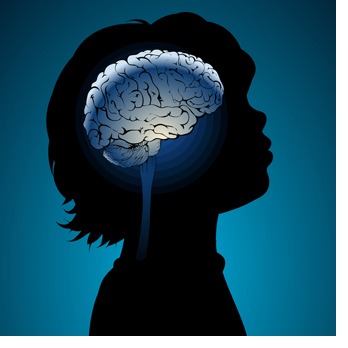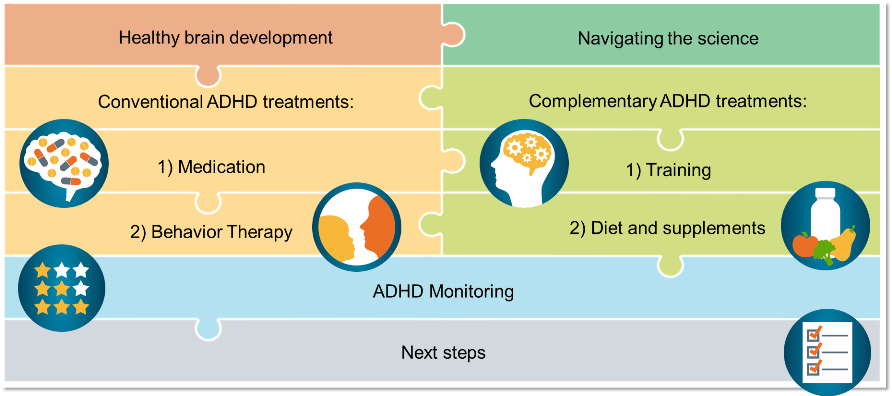Online Course: How to Navigate Conventional and Complementary ADHD Treatments for Healthy Brain Development
 Course Objective and Description
Course Objective and Description
NOTE: This course has been discontinued
In order to successfully promote children’s healthy brain development, every parent whose child has been diagnosed with ADHD should learn how to systematically navigate and monitor the range of potential ADHD treatments based on the latest scientific evidence. This course aims at providing the necessary information, frameworks and toolkits to make well-informed decisions, in conjunction with professional advice, about medication, behavioral therapy, exercise, neurofeedback, working memory training, meditation, diet and supplements.
By the end of this 6‑hour online, self-paced course participants will have gained the understanding and information required to navigate, prioritize and monitor ADHD treatments, both conventional and complementary, to maximize short-term and long-term healthy brain development for children with ADHD.
Who this is for
Combining the latest evidence-based guidelines and reviews put forward by the American Academy of Pediatrics with the independent research analysis and expertise by the Faculty, this new course can be a valuable resource for parents whose child has been diagnosed with ADHD and also for professionals seeking to stay updated.
The Faculty
 Dr. David Rabiner, founder of the Attention Research Update, is an Associate Dean and a Research Professor in the Department of Psychology and Neuroscience at Duke University. His research centers on the impact of attention difficulties on children’s academic achievement, improving community care for children with ADHD, the misuse of ADHD medications by college students, and interventions to improve academic performance in children with attention difficulties. He has published over 50 scientific papers in peer reviewed medical and psychology journals and received funding for his research from the National Institutes of Mental Health, the Centers for Disease Control, and the US Department of Education. Dr. Rabiner started publishing the Attention Research Update e‑newsletter in 1997 to provide parents, educators, and health care professionals with a convenient and independent source to stay informed about the latest research on ADHD published in leading medical and psychology journals.
Dr. David Rabiner, founder of the Attention Research Update, is an Associate Dean and a Research Professor in the Department of Psychology and Neuroscience at Duke University. His research centers on the impact of attention difficulties on children’s academic achievement, improving community care for children with ADHD, the misuse of ADHD medications by college students, and interventions to improve academic performance in children with attention difficulties. He has published over 50 scientific papers in peer reviewed medical and psychology journals and received funding for his research from the National Institutes of Mental Health, the Centers for Disease Control, and the US Department of Education. Dr. Rabiner started publishing the Attention Research Update e‑newsletter in 1997 to provide parents, educators, and health care professionals with a convenient and independent source to stay informed about the latest research on ADHD published in leading medical and psychology journals.
 Alvaro Fernandez, named a Young Global Leader by the World Economic Forum, is the co-author of the acclaimed book The SharpBrains Guide to Brain Fitness: How to Optimize Brain Health and Performance at Any Age (2013). He runs SharpBrains, an independent market research firm tracking health and wellness applications of brain science. He is a nationally-known speaker and expert, and has been quoted by The New York Times, The Wall Street Journal, New Scientist, CNN, and other media outlets. Alvaro, who holds an MBA and an MA in Education from Stanford University, produces the annual SharpBrains Summit, the largest global and virtual conference where scientists, innovators and professionals discuss the latest developments in the field.
Alvaro Fernandez, named a Young Global Leader by the World Economic Forum, is the co-author of the acclaimed book The SharpBrains Guide to Brain Fitness: How to Optimize Brain Health and Performance at Any Age (2013). He runs SharpBrains, an independent market research firm tracking health and wellness applications of brain science. He is a nationally-known speaker and expert, and has been quoted by The New York Times, The Wall Street Journal, New Scientist, CNN, and other media outlets. Alvaro, who holds an MBA and an MA in Education from Stanford University, produces the annual SharpBrains Summit, the largest global and virtual conference where scientists, innovators and professionals discuss the latest developments in the field.
.
Course outline

.
Course registration includes:
- One-year access to two recorded lectures and Q&A sessions, each of them lasting two hours and a half.
- One-year access to an online library with additional resources
- One-year access to treatment monitoring system: The course includes a complementary treatment monitoring system for 1‑year to course participants. Based on Dr. Rabiner’s guidance, a software vendor has developed an online system that enables health professionals and parents to track children’s progress via the online distribution and scoring of behavior rating forms. Course participants will receive a certificate that their child’s clinician can use to receive systematic, regular feedback on how the child is doing at home and school for 12 months at no charge. The value and importance of treatment monitoring is one of the important topics that will be address in the course.
- One-year access to a private online community to enable registered participants to interact with the Faculty and with each other.
Note: Registered course participants can access these resources by logging in HERE.
Syllabus
This fast-paced online course will cover the following topics:
1. How to harness Medication, Lifestyle and Neuroplasticiy for Lifelong Brain Development
- Value, limitations and appropriate scenarios of use for each
- Treating ADHD in the context of general brain development: A lifespan approach
- Reading: Fact-sheet on ADHD in Children and Adolescents by the National Institute of Mental Health
- Reading: Study: Families’ Perspectives on ADHD and its Treatment
2. What is research support, and what are its limitations? How can parents thoughtfully evaluate the claims made by proponents of different treatments, and successfully advocate for their children?
- Reading: Study finds large gaps between research and practice in ADHD diagnosis and treatment
- Reading: Sensible and perplexing changes in ADHD diagnostic criteria (DSM‑V)
3. ‘Conventional’ ADHD treatments: Medication and Behavior Therapy
- Is medication treatment really effective? (It depends on how you ask the question)
- What does the research say about short- and long-term benefits of medication treatment?
- What does good medication treatment really look like and how can parents obtain ‘good’ treatment for their child?
- What is behavioral therapy for ADHD really all about?
- What do we know about the short-and long-term effects of behavior therapy for ADHD?
- What are the strengths and limitations of behavior therapy?
- Working with teachers to develop a good behavior plan.
- Reading: Reducing the Need for High Medication Doses with Behavior Therapy
- Reading: Why Being Young for Grade Increases Odds of ADHD Diagnosis and Stimulant Medication
- Reading: Evidence-based child and adolescent psychosocial interventions
4. Alternative and complementary treatments
Exercise
- What does it have to do with ADHD?
- What are the guidelines for optimal weekly/ monthly exercise?
- Reading: Physical exercise as ADHD treatment: Necessary but not sufficient
Neurofeedback
- What is neurofeedback and how does it work?
- What is the current evidence base for neurofeedback treatment for ADHD?
- Things to consider when thinking about neurofeedback.
- Reading: Neurofeedback treatment for ADHD is gaining strong support
Working memory training
- What is working memory and what does it have to do with ADHD?
- What does working memory training involve?
- What is the current evidence base for working memory training for ADHD?]
- Things to consider when thinking about working memory training.
- Reading: Is working memory training the priority for ADHD patients?
Meditation
- What is meditation and what does it have to do with ADHD?
- What meditation techniques offer the most clear evidence base for ADHD?
- Things to consider when thinking about meditation.
- Reading: Mindfulness training for children with ADHD and their parents
Diet
- What kinds of diets have been tested as treatments for ADHD?
- How strong is the research support for dietary interventions for ADHD?
- Things to consider when thinking about a dietary intervention.
- Reading: ‘Western’ Style Diet Increases Risk of ADHD
Supplements
- Vitamin, mineral, and fatty acid deficiencies in relation to ADHD
- Do supplements work? What does the research say
- When to consider supplements
- Reading: A Controlled Trial of Herbal Treatment for ADHD
5. How can a parent navigate these options and obtain, monitor and help iterate the best care for a particular child
- How to prioritize and sequence most-likely-to-help interventions, both conventional and complementary
- How to monitor their short-term and long-term effectiveness
- How and when to communicate with health professionals to iterate and refine care

 Required technology
Required technology
- All that is required to participate in the course is a computer or a tablet with Internet access
If you have any questions or would like further details about the course please Contact Us.
